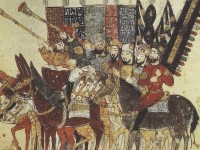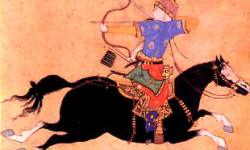In the 7th century, a new religion emerged in the Middle East in the territory of Arabia: Islam.
This not only meant that first united the otherwise hostile Arab tribes under an ideal, but also to the fact that the Arab empire not only subjugated almost the entire Eastern Roman Empire but also penetrated as far as western Europe today's Spain.
This was triggered by the first Caliph Abu Bakr, who managed to unite the otherwise mutually combative Arab tribes and to create a powerful force. The actual expansion was carried out by his successor Umar ibn al-Chattab. Thus, in 636, the Arab army attacked the southern border of the Byzantine Empire and destroyed the Byzantine army on the present-day border between Syria and Jordan. Two years later, Jerusalem was also occupied, and by 641 the Arab army conquered the area around the present-day states of Syria, Palestine and Egypt and defeated the then Sassanid Empire.
Although the Arab force was still very small, but managed to secure the occupied territories quickly, accelerated by the high number of people who joined Islam as a religion.
Due to more intimate power struggles, further conquest campaigns did not take place in the next decades. The height of the disputes was the Battle of Karbala in 680, when the army of Husayn ibn Ali, the grandson of the Prophet Muhammad, was destroyed by the Umayyad Caliph Yazid I.
The subsequent massacre of followers Husain ibn Ali shook Islam so much that religion split into the extremely hostile Sunni and Shiite camps.
After the Battle of Karbala, the conquest campaigns continued to be promoted. Thus, today's Iran and Afghanistan were occupied and even to Pakistan, the army prevailed. In the west, Tripoli and Cyprus were also conquered.
711 crossed the army for the first time the road from Gibraltar, first for raids subsequently to the conquest, whereby almost the entire peninsula fell into the hands of the Arabs.
You can find the right literature here:
Destiny Disrupted: A History of the World Through Islamic Eyes
In Destiny Disrupted, Tamim Ansary tells the rich story of world history as it looks from a new perspective: with the evolution of the Muslim community at the center. His story moves from the lifetime of Mohammed through a succession of far-flung empires, to the tangle of modern conflicts that culminated in the events of 9/11. He introduces the key people, events, ideas, legends, religious disputes, and turning points of world history, imparting not only what happened but how it is understood from the Muslim perspective.
He clarifies why two great civilizations-Western and Muslim-grew up oblivious to each other, what happened when they intersected, and how the Islamic world was affected by its slow recognition that Europe-a place it long perceived as primitive-had somehow hijacked destiny.
With storytelling brio, humor, and evenhanded sympathy to all sides of the story, Ansary illuminates a fascinating parallel to the world narrative usually heard in the West. Destiny Disrupted offers a vital perspective on world conflicts many now find so puzzling.
History of Islam (3 Volumes)
History stands as the most effective and valuable source of putting nation on the course of progress and prosperity and saving them from the path of disgrace and degradation. At a time, when there is tough competition among the nations of the world to excel one another, the Muslim, despite having the most glorious history, appear to be detached and careless as regards their history. This book presents the true Islamic events and their actual causes before the English readers because the other books in the English language found on the Islamic history have been written by such authors and compilers who did no justice in presenting the true picture of Islamic Era but their prejudice prevented them from doing so.
Islam: Faith and History
Combining the personal with the scholarly, this innovative introduction gives the reader an insight into Islam and its rich history.
Islam: A Short History (Modern Library Chronicles)
No religion in the modern world is as feared and misunderstood as Islam. It haunts the popular imagination as an extreme faith that promotes terrorism, authoritarian government, female oppression, and civil war. In a vital revision of this narrow view of Islam and a distillation of years of thinking and writing about the subject, Karen Armstrong’s short history demonstrates that the world’s fastest-growing faith is a much more complex phenomenon than its modern fundamentalist strain might suggest.
This post is also available in:
 Deutsch (German)
Deutsch (German)  Français (French)
Français (French)  Italiano (Italian)
Italiano (Italian)  简体中文 (Chinese (Simplified))
简体中文 (Chinese (Simplified))  Русский (Russian)
Русский (Russian)  Español (Spanish)
Español (Spanish)  العربية (Arabic)
العربية (Arabic)
















